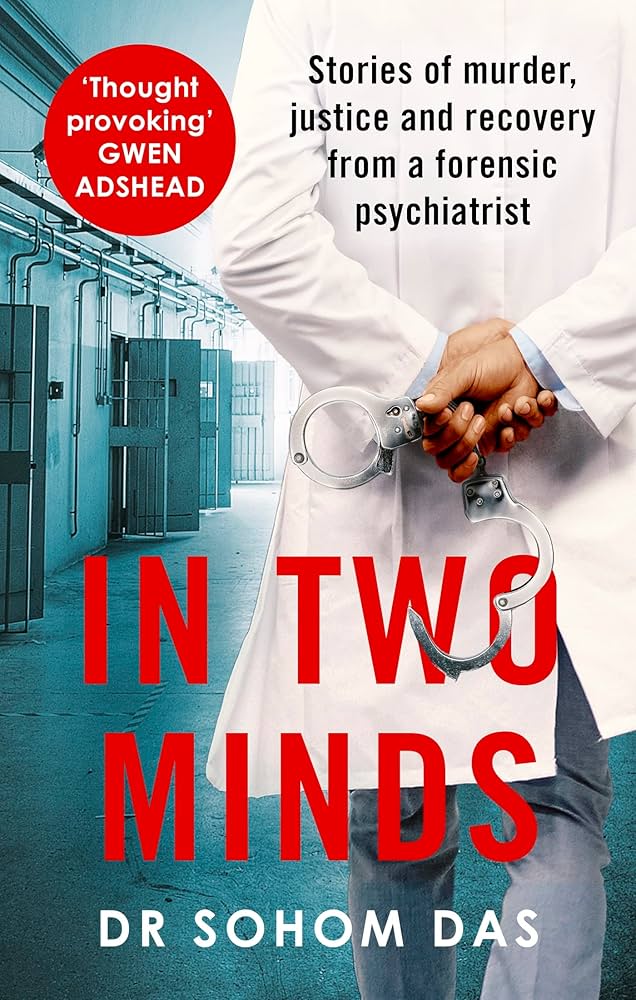Dr Sohom Das is probably not your average consultant forensic psychiatrist. He’s altogether more modern, young, hip even. His knowledge and experience as an expert in his field are clear. He has innovative ways to help others explore the complex and fascinating topics of mental illness, crime, and violence.
Dr Das is based in London and works within the criminal justice system. His specialty is criminal psychiatry and he assesses and rehabilitates mentally disordered offenders. His days are spent assessing severely mentally ill offenders across different settings; in prison, in court, and in secure locked forensic psychiatric units. Dr Das also works as an expert witness during a criminal trial, advising judges about psychiatric defenses and providing his expert opinion on a defendant’s state of mind.
What is especially unique about this criminal psychiatrist is how he engages with the world. When not working, he has been known for some stand-up comedy acts. He’s friendly, outgoing, and approachable. His discussions on mental health and criminal offending are engaging and interesting. He brings a level of accessibility to the often closed-off world of criminal psychiatry. His video podcast, A Psych For Sore Minds is an excellent medium for allowing and encouraging those who are curious and fascinated to gain an understanding of these complex topics from an experienced expert.
On 10 March 2022, Dr Das released his first book, In Two Minds. A fascinating memoir of a career specialising in the complexities of the human mind and what happens when mental health crosses over with criminality. If you ever wondered about the work and life of Forensic Psychiatrist and how complex mental health needs are navigated within the confines of the criminal justice system when behaviours mean justice and punishment are also involved, this book is for you.
Dr Das has very kindly given me his time to answer some questions about his daily work and his field.
Q&A With Forensic Psychiatrist Dr. Sohom Das
Q. You have worked as a psychiatric doctor for almost 15 years, including being a consultant psychiatrist for 6 years and you must have seen a huge array of cases during that time. Which patients stand out for you, are there patients and cases you have been particularly affected by?
SD – I do think I am generally emotionally detached from my patients and the horrific offences they have sometimes committed. However, there are occasionally cases that stick in my mind. For me, these tend to be when the defendant themself is quite vulnerable and has committed a completely inexplicable and sudden act of violence. I remember assessing an 18-year-old schoolgirl who was previously of good character who had no previous offending or delinquent behaviour and also no known mental illness. Suddenly, out of the blue, she developed a psychosis and tragically killed her nephew while babysitting him. She was floridly psychotic at the time and believed that she was removing demons from the child and that he would be resurrected. She had no idea what she had done. I was the expert witness called by the court. The evidence I gave spared her from a prison sentence and got her transferred to a medium-secure psychiatric unit for a long process of treatment and rehabilitation. This case was very visceral for me as I regularly spoke to her brother (the father of the deceased child) who was very supportive.
I have also had a patient with psychotic depression, a middle-aged woman with teenage children who committed suicide on the ward. I had to break the news to her husband shortly afterwards; that was a harrowing conversation that I will never forget.
I have occasionally faced anger and aggression from patients; usually as they are detained in hospital by this time. One occasion, a psychotic young man was very paranoid and barricaded the door during a ward round. He would not let me or any of the other staff members out for about an hour. We eventually persuaded him to let us go, but it was not easy. He was out of touch of reality and hearing voices at the time. Aside from these patients, generally, I am not particularly emotionally affected by cases. Far less than my peers and my colleague, I think. I might be a bit of a psychopath (or at least have some traits!)
Q. You’ve recently launched your YouTube podcast called ‘A Psych for Sore Minds’, which I have to say I think is fantastic. It’s a real insight into your field and fascinating to listen to and watch. What made you want to start the podcast and what are your aims for taking it forward?
SD – That’s very kind of you. Thank you.
I started this podcast because I realised that other people find my line of work fascinating; probably more than I do. I’ve gotten used to all the gory and heart-breaking scenarios I see. When I tell neighbours, friends or family about my cases, they always want to know more. I therefore appreciated that there is a market to share my experiences and opinions with the wider masses.
I also think that there is has been lot of representation about mental illness recently. This includes celebrities ‘coming out’ about their previous issues. This is definitely a good thing and will contribute to helping to decrease stigma. However, from what I have seen, there is little representation for the more serious ends of the spectrum; for example, people with schizophrenia or people who have previously been sectioned and hospitalised for much of their lives. These are the kind of clientele I see in my line of work and my YouTube channel gives them a voice.
Another reason I started ‘A Psych for Sore Minds’ was that I was concerned about the lack of experience and credibility of some of the host and content creators out there. It seems that some of these people just recite obvious material from text-books or have uninformed opinions that they convey as facts. I think I have the authority to talk about offending and mental illness from my line of work. My USP is discussing actual real-life cases that I have been involved in (though I anonymise these out of respect for patient confidentiality). I feel I have a duty to ensure that the information that is put out into the ether is accurate, genuine and based on actual clinical experience.
‘A Psych for Sore Minds’ is an eclectic channel. As well as discussing cases relating to offending, I also dissect a number of other issues related to mental health that are unrelated to offending. This includes interviewing people who have suffered severe mental disorder, including deliberate self-harm, suicide attempts and people who have been detained in psychiatric hospital. I think there is something for everybody on my channel. My aims? To take over the world! I am very new to the You Tube hosting world. Our channel has only been going a couple of months. We are growing steadily though I think we are nowhere near our potential. Clearly, there is a big niche in the overlap of true crime and mental illness. I want to grow and grow and grow. Like the hungry caterpillar.
Q. When you have made a diagnosis of mental illness in a defendant, what is the process for assessing how much influence that disorder had in the defendant’s offenses? I imagine this is easier in some cases than others, but quite complex for determining criminal responsibility and recommendations to the court?
SD – This is all about carefully analysing all the available evidence in extreme detail for clues about the defendant’s state of mind and intentions. Being a forensic psychiatrist is not quite as glamorous as it sounds. For every hour that I am assessing a defendant in prison or giving evidence in court, I probably spend around 6 to 7 hours just sifting through files of evidence and medical notes and writing up reports. I spend much more time in coffee shops than I do on the witness stand.
Another factor is that the threshold for somebody to be not culpable for their criminal behaviour (such as the psychiatric defences of ‘not guilty by reason of insanity’ or ‘diminished responsibility’) is actually quite high. The legal criteria area also very specific. In other words, somebody can be floridly psychotic (e.g. hearing voices or suffering intense paranoia), yet still have criminal culpability. In this scenario, they still might be transferred to hospital instead of prison if they are acutely unwell. Alternatively, they might have some leniency in their sentencing or serve a community sentence with conditions of medical treatment. Despite this, they still might be technically culpable in the eyes of the law.
Q. As an expert witness in criminal trials, your assessment and conclusions about an offender and any diagnosis will have a significant impact on their fate. That is a lot of responsibility to carry with so much weight given to your testimony. Is it difficult to be sure of a diagnosis in some cases and how do you deal with that difficulty if testifying in court?
SD – I would say that in most cases, the diagnosis is clear cut. Again, researching each defendant’s medical history is half the battle in terms of making an accurate diagnosis.
Around a quarter of cases are more complex for a number of reasons; lack of available medical notes, the defendant is either not cooperating or might be malingering or simply that there are multiple intertwined mental illness issues. In these trickier cases, it is important to be absolutely balanced and honest to the Court. If there are diagnostic grey areas or doubts, I make this abundantly clear in my evidence that I give. I might say that there is a spectrum of reasonable conclusions and highlight where on that spectrum my views lie. It’s also important to remember that my opinions are given on the balance of probabilities.
I see some psychiatrists struggle with this. They can be narrow-minded, stubborn and unbalanced in their views. They sometimes insist that only their final conclusions can be correct. These are the people who get ripped to shreds during cross-examination from the opposition barrister and the judge and, I have to say, it does give me a tiny bit of pleasure to witness this (!)
It is also really important to understand our role. This is only to help the Criminal Court understand complicated psychiatric issues in which it does not have expertise, and I do. It is never to convince the Court of any particular opinion. It can be an intimidating scenario to be cross-examined by judges or aggressive barristers, whose job it is to cast doubt on my opinions. However, it is not important for me to have to be right. It is only important to guide the Court so that it can make its own decision. Forensic psychiatrists have to leave our egos at the door – which is easier for some of us than others!
Q. Managing mentally disordered offenders in prison seems to be a very difficult area. With such a wide range of personalities, mental health states and criminal histories all combined in one prison population, how difficult is it to identify needs and provide treatment under these circumstances?
SD – Very.
It goes without saying that the environment of prison itself can trigger or exacerbate mental illnesses; not only relatively common ones like anxiety and depression, but also the rarer disorders like schizophrenia or mania. It’s no secret that mental illness and personality disorder are rife in prison.
A major challenge is simply the workload for most Mental Health In-Reach Teams in prisons. There are a constant stream of prisoners coming through and not enough members of staff to see them. This is hardly surprising with funding deficits in both the mental health and criminal justice systems.
The lack of resources spills into other areas. For example, most prisons have a Healthcare Unit, which is a bit like a psychiatric ward within a prison. These are staffed by nurses and doctors and the prisoners are assessed daily. They have access to support and treatment, such as regular medication and psychological therapy. This is a much more calm, clinical and therapeutic environment than the prison wings. However, the bed spaces are limited and cannot keep up with the increasing number of mentally ill prisoners. In one of the prisons where I have previously worked, all the beds were full almost all the time, meaning that very ill inmates had to overspill into the prison wings.
Another salient issue is the waiting lists to transfer very ill inmates to secure psychiatric units. Most prisoners are deemed to be too high-risk and dangerous for general mental health wards. Rehabilitation in these secure units is often a slow and arduous process; typically, patients are detained in these units for a few years, sometimes even longer. This means that the discharge rate and turnover of these units is very low. This in turn lengthens their waiting list. There is often a backlog of psychotic prisoners who desperately need medication and other treatment.
Another issue is a lack of background information. Often, when prisoners arrive, we have no access to their medical notes. This makes it challenging to make diagnoses, as we only have a snapshot of their current presentation.
Mental illness is not always obvious or linear; some symptoms are subtle or can change over time. I have seen several prisoners who were paranoid due to psychotic experiences and stayed inside their cells. They barely interacted with people, so they didn’t even come to the attention of the prison mental health team for months. Classic case of ‘the squeakiest wheel gets the grease.’
Further, there are prisoners who fabricate or lie about symptoms with the intention of either being transferred to a psychiatric unit, to get medication, or even just to move wings. Some psychiatric medication can give you a ‘buzz’. These are often used as prison currency. So unsurprisingly, some inmates do anything to get their hands on this.
Q. How often do you see defendants that do try to fabricate mental illness and how easy is it for you to spot?
SD – This happens fairly frequently. Sometimes, they are also exaggerating genuine symptoms. It is actually relatively easy to spot. This is because mental illnesses generally gradually develops over time. It is unusual (though not impossible), for somebody to become floridly psychotic very quickly. Therefore, I research each defendant’s medical history; scouring through old medical notes. Similarly, I examine objective evidence about their mental health at the time of the offence (via witness statements, police interview transcripts and CCTV footage, etc) and I look for any inconsistencies from what they are reporting themselves.
Another issue is the defendant’s agenda. Somebody who is truly psychotic or unwell generally is quite guarded and paranoid. It takes a lot of effort and digging around to elicit these subtle symptoms. However, somebody who is feigning because they wanting to go to hospital (e.g. in the hope that the judge drops the charges) will try and force it. They will usually attempt to convince me that they are unwell.
It’s all about experience. I have assessed well over a thousand defendants. Only a small proportion have been seriously mentally unwell. I know what this looks like and doesn’t look like. I’ve built up a fairly effective BS radar. Luckily for me, a lot of offenders are not particularly good actors. However, I have to say that very occasionally I do get caught out; there have been a couple of cases where I have been duped.
Q. The area of criminal law for diminished responsibility seems quite a complicated and confusing defense. It is a partial psychiatric defense, but how does that actually work, and what would your role be in these cases?
SD – Diminished Responsibility downgrades a murder charge to manslaughter. In England, murder is a mandatory life sentence, whereas the sentencing for manslaughter is completely at the Judge’s discretion; they could choose life imprisonment, or release the defendant or any anything in between.
This is exactly the kind of case that I am instructed to deal with; I look at all the available evidence and carry out a “Mental State Examination’ of the accused. I piece together their mental state, their thought processes and their intentions at the time of the offence. I then match it to the very specific legal criteria for the Diminished Responsibility. It requires intimate knowledge of psychiatry and of the law. The former is straightforward for me; I have been training in this field for many years. The latter is more challenging; I’ve had to read around the subjects and have picked it up with experience.
Q. I’m curious about when a serious crime has been committed while in a drug-induced psychosis and the defendant does not have a history of mental disorder. How would you go about your assessment in a case like this? And how difficult is it to determine criminal culpability in these cases?
SD – The first step is differentiating these cases from an acute relapse in someone who suffers from a recurrent psychosis, such as schizophrenia. This is all about timing; a drug-induced psychosis only lasts whilst the illicit substances are in the defendant’s system (i.e. two or three days) and it resolves spontaneously (i.e. without medication). A relapse of chronic psychosis can last weeks or months and only improves with anti-psychotic medications. Sometimes, I delay the assessment by a day or two, to ascertain the trajectory of the recovery.
It also helps to know if and when the subject used drugs and which type; some substances are far more likely to cause drug-induced psychosis than others (e.g. amphetamines do, opiates don’t). In some instances, it is pretty obvious. They will admit it themselves, or somebody who is close to them and worried about their mental state will report it. But there are also occasions when I have no knowledge. The police don’t carry out urine drug screens on all suspects. Even when they do, some substances don’t show up in these tests; for example, the newer synthetic cannabinoids.
Criminal culpability is especially tricky in cases of drug-induced psychosis. If the defendant was simply intoxicated, then obviously there is no psychiatric defence during their criminal trial. If that were the case, then lots of people would try and get away with innumerable offences on the basis that they were wasted! However, if it was either involuntary intoxication (e.g. if their drink was spiked) or if they flipped into actual drug-induced psychosis (i.e. they were out of touch with reality), then this could potentially decrease their criminal culpability. For me to make that call, I have to examine all the available evidence thoroughly. This is in view of determining exactly what their mental state at the time. I study witness statements, police interview transcripts and CCTV footage. I look for evidence of psychosis (such as hearing voices or paranoid delusions). The threshold to not have criminal culpability (e.g. a defence of ‘not guilty by reason of insanity’) is very high. I only make this case for a minority of cases.
Q. How do you rehabilitate mentally disordered offenders? Is it about managing their mental illness, gaining control of their symptoms and then in turn trying to address their criminal offending and behaviour?
SD – If they are actively mentally ill, defendants are transferred to secure psychiatric units; I have worked on several of these in my career. They have extra levels of security, such as double-locked magnetic doors and a perimeter fence. They also have seclusion rooms to house the most agitated and disturbed patients.
The first step, as you say, is treating their symptoms using medication, such as anti-psychotics. Typically, these patients have complex and trenchant psychosis and often need multiple medications at high doses. Recovery might take several months or longer. Then we also instigate psychological therapy, such as relapse prevention and also helping the patients figure out the set of circumstances that have contributed to their offending in the past (such as illicit drug use or anti-social peers). Drug and alcohol rehabilitation is another key factor.
We also monitor the patients’ behaviour and boundary breaches (psych-speak for ‘rule-breaking’) on the ward; this is an indication of their overall level of risk. When they have shown consistent stability and engagement in therapy, we start testing them on leave. This is usually escorted with nurses at first and then eventually unescorted. All leave is structured and purposeful. Leave can be rescinded if conditions are broken.
Finally, occupational therapy is a key area. This includes educational courses, voluntary work or building up skills for future employment. This massively improves the patient’s chances of surviving in the community after eventual discharge; if they have a job and a career, they are much less likely to return back to crime and also less likely to relapse in their mental illness.
Thank you, Dr Das, for answering my questions and giving us such amazing insight into your work! If you’re interested in mental health and the crossover with offending, learn more at the YouTube podcast A Psych For Sore Minds with Dr Das.


![University of Idaho Murders: The Bryan Kohberger Investigation [Part 2]](https://www.crimetraveller.org/wp-content/uploads/2025/03/bryan-kohberger-cover-218x150.jpg)
![University of Idaho Murders: The Bryan Kohberger Investigation [Part 1] Idaho murders, university student victims](https://www.crimetraveller.org/wp-content/uploads/2025/03/Idaho-University-Murders-218x150.jpg)









To come to this decision, the trial judge who does not have the expertise to assess a mental disorder of the defendant and its relation to the offense needs to obtain information from a behavioral expert.